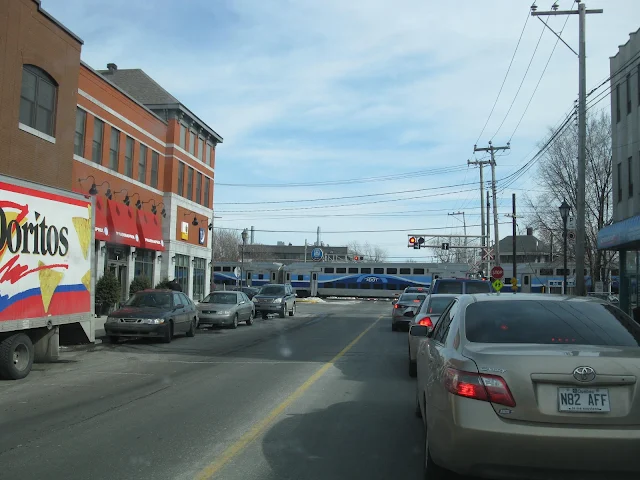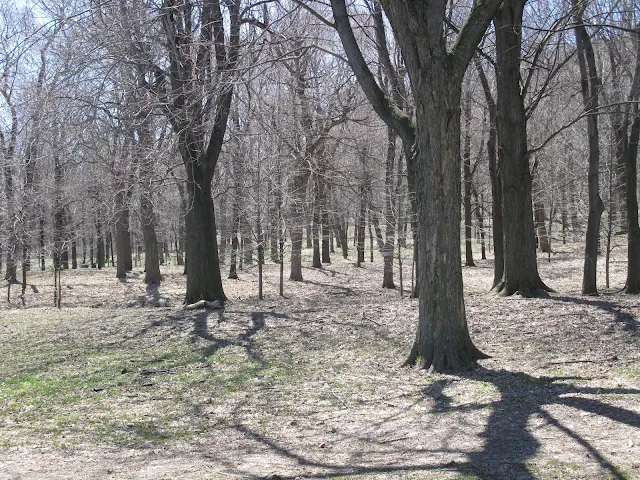 |
| My grandfather, John R. Parker, and his bride, Bertha Chew; photo taken in Blackburn, Lancashire. |
I don't like to admit that I never liked my maternal grandfather but I didn't; maybe I was afraid of him. Where does a child get his likes and dislikes for people? And after all of these years like and dislike don't have much relevance; now I have a new respect my grandfather. My grandfather, John R. Parker, died in 1964 when I was fourteen years old; almost sixty years earlier he and his wife came to Montreal from Blackburn, Lancashire, by way of New York City where he lived for a while in the Bronx with his paternal uncle, William Parker. In New York City my grandfather worked driving a streetcar; one day someone tried to rob him, this would have been around 1910, and my grandfather jumped from his streetcar and chased the man; my grandfather was also a boxer and he easily subdued the thief. One day I was driving my mother to Central Station where she would take a train to Toronto, this was in the early 2000s; at a street corner we were passing she said this was where her father had seen a man robbing a woman and he had chased and caught the man.
Like many other women my mother loved and admired her father; I mention this because men like my grandfather are becoming rare, the masculine is under attack in North America; men like my grandfather are dinosaurs now. My grandfather could level wooden floors, build a balcony on their home, he could do things that needed doing and he provided for, protected, and looked after his family. When a man followed my mother home, after she married in 1940, she phoned her father and he was at her apartment a few minutes later; when there was a streetcar accident near her home it was her father she called.
There are other anecdotes about my grandfather. My grandfather was a fireman, first in the early 1920s at the Central Fire Station in Old Montreal, later he was the captain, at Station (Caserne) 46 on Somerled Avenue in Montreal. His brother, Thomas Herbert ("Bert") Parker, was at Station 11 in downtown Montreal; Bert was also a captain. There was a history of feuding in my mother's family; my father's family, the Morrisseys, didn't feud, they all seemed to get along with each other, they were happy Irish-Canadians and stuck together; they loved each other, and we all loved my grandmother who was the center of the family. As for the Parkers, my grandfather didn't talk to his brother Bert for thirty years and he missed his mother's funeral because they were fighting. I have no memory of meeting my Parker grandmother, Bertha Chew Parker, who died in 1957 when I was seven years old, but I have this one anecdote. My grandparents gave my mother $5.00 a month (or was it a week?) to help with expenses after my father died in 1956, $5.00 meant something back then; when she would visit them her mother would say to her father, "Don't forget to give Hilda her money."
 |
| Grave of my great uncle, Thomas Herbert Parker, who died on 27 December 1965; buried at the Protestant fireman's section at Mount Royal Cemetery. |
 |
| Victor Parker, the youngest of the four Parker brothers, and who was mentally handicapped; in Montreal. |
As I said, one of my grandfather's brothers, Thomas "Bert" Parker, became a fire man like my grandfather. And there were two other brothers, one was William and the other was Victor who was the youngest. I think it was William who worked in security at Dorval airport after he retired. Sometimes I would visit my grandfather's home at 2217 Hampton Avenue; one day there was smoke in the flat and soon the fire engines arrived; I heard the captain laughing and commenting that there was no fire, he said my grandfather just wanted his chimney cleaned by them for free.
One day my grandfather told me that when he was a boy, and still living in Blackburn, he was hungry and killed a chicken and roasted the bird on an open fire in a lane. The Parkers were not wealthy, his father had died when he was a child. I think, for him, marrying a Chew was to marry up as the Chews were a big family and owned property, they were builders and landlords. The Parkers had been publicans--they were publicans at the Yew Tree Inn in Blackburn--and farmers; my grandfather's father could speak, I was told, several languages.
Another story my grandfather told me was that when he first became a fireman he was told by the captain of the fire station to clean the metal buttons on the harnesses of the horses that pulled the fire engine. He was at Station One, the old Central Fire Station in Old Montreal. When he finished cleaning the buttons the captain told him to do it again, he had missed the buttons on the underside of the harness where they wouldn't be seen, except by the captain; I think my grandfather may have protested but was told to do it right. This seems like a fairly minor anecdote but while many anecdotes seem minor they all help to bring family members to life, and we remember them for these stories. Another anecdote, a minor one, is my grandfather telling me that when you wrapped a parcel in a box to tie the knot on a corner and it would hold better. Any family memory is better than none, even minor ones like this.
.jpg) |
| Central Fire Station |
 |
| At the Central Fire Station, photo taken in the 1930s, my grandfather is on the far right. |
 |
| At Station (Caserne) 46, John Parker is the second from the left, early 1940s. |
 |
| Montreal Memorial Park (now owned by Urgel Bourgel), St. Laurent, Plot A 501, Grave no. 676. Parker. Bertha (Chew) 1884-1958 John Richards (1887-1964) |
.jpg)

















.jpg)
.jpg)
.JPG)

.JPG)
.JPG)
.JPG)
.JPG)
.JPG)







